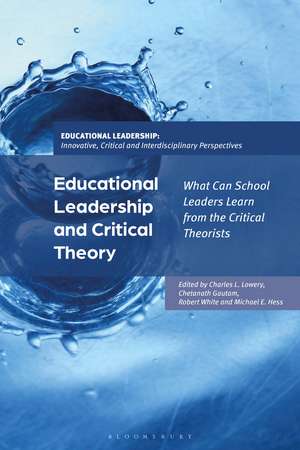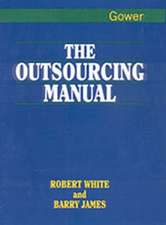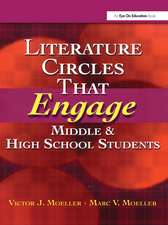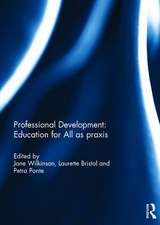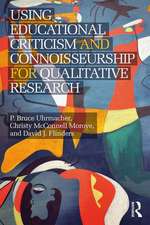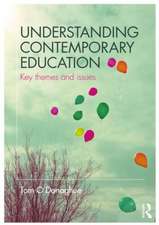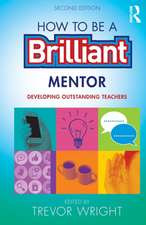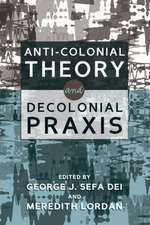Educational Leadership and Critical Theory: What Can School Leaders Learn from the Critical Theorists: Educational Leadership: Innovative, Critical and Interdisciplinary Perspectives
Editat de Charles L. Lowery, Chetanath Gautam, Robert White, Michael E. Hessen Limba Engleză Hardback – 13 dec 2023
Preț: 540.54 lei
Preț vechi: 774.14 lei
-30% Nou
Puncte Express: 811
Preț estimativ în valută:
103.44€ • 112.33$ • 86.89£
103.44€ • 112.33$ • 86.89£
Carte tipărită la comandă
Livrare economică 22 aprilie-06 mai
Preluare comenzi: 021 569.72.76
Specificații
ISBN-13: 9781350353428
ISBN-10: 1350353426
Pagini: 272
Ilustrații: 10 bw illus
Dimensiuni: 156 x 234 mm
Greutate: 0.55 kg
Editura: Bloomsbury Publishing
Colecția Bloomsbury Academic
Seria Educational Leadership: Innovative, Critical and Interdisciplinary Perspectives
Locul publicării:London, United Kingdom
ISBN-10: 1350353426
Pagini: 272
Ilustrații: 10 bw illus
Dimensiuni: 156 x 234 mm
Greutate: 0.55 kg
Editura: Bloomsbury Publishing
Colecția Bloomsbury Academic
Seria Educational Leadership: Innovative, Critical and Interdisciplinary Perspectives
Locul publicării:London, United Kingdom
Caracteristici
Uses ideas from critical theorists including Adorno, Fromm, Marcuse and Habermas and connects them with contemporary theories and debates
Notă biografică
Charles L. Lowery is Associate Professor of Educational Leadership at Virginia Tech, USA.Chetanath Gautam is Associate Professor of Educational Leadership at Delaware State University, USA.Robert White is Endowed Professor at Elizabeth City State University, North Carolina, USA.Michael E. Hess is Associate Professor of Educational Studies at Ohio University, USA.
Cuprins
Series Editors' Foreword List of Contributors Introduction: Why Critical Theory and Educational Leadership?, Charles L. Lowery (Virginia Tech, USA)Part 1 Critical Educational Leadership for Understanding School and Society through the Theoretical and Reflective Lenses, Chetanath Gautam (Delaware State University, USA), Robert White (Elizabeth City State University, USA), and Michael E. Hess (Ohio University, USA) with insights from contributors1. Educational Leadership through the Lens of Critical Theory, Chetanath Gautam (Delaware State University, USA)2. Understanding the Role of Education in Emancipation, Liberation, and True Democracy, Robert White (Elizabeth City State University, USA)3. Educational Leadership as a (Consumer) Culture Industry, Richard Niesche (University of New South Wales, Australia)4. Is Transformational Leadership One-Dimensional?, Robert E. Kirsch (Arizona State University, USA)5. Cultivating Relations of Freedom through Education Leadership by Drawing from the Critical Theory of Herbert Marcuse, Patrick M. Jenlink (Stephen F. Austin State University, USA)6. How Educational Leaders Make Better Decisions through a Frankfurt School Understanding of Rational Decision-Making, Chris Brown (Durham University, UK)Part 2 Critical Educational Leadership for Improving School and Society through the Pragmatic and Active Lenses, Charles L. Lowery (Virginia Tech, USA) with insights from contributors7. Competitive Character in Education and the Frankfurt School's Theory of a New Anthropological Type, Taylor Hines (Arizona State University, USA)8. Marcuse's Critical Theory for the Educational Practice of Critical Media Literacy, Steve Gennaro (York University, Canada) and Douglas Kellner (UCLA, USA)9. Perspectives of the Relationship as an Enduring Message of Hope through Dialogue, Reflection, and Action in Freire's Pedagogy of the Oppressed, Betty J. Alford (CalPolyPomona, USA), Rene Levario (CalPolyPomona, USA), Sergio Chavez (CalPolyPomona, USA), and Alberto Medina (CalPolyPomona, USA)10. Unpacking the Intersections of Habermas's Critical Theory and Ladson-Billings's Culturally Relevant Practice, Anthony Walker (Tarrant Count College District, USA)11. A New Critical Theory and the Black Divide, Rhonda T. Humphries (George Washington University, USA)12. African American Education for Liberation in Twenty-First-Century America: From Critical Theory to Black Power, Bakari K. Lumumba (Ohio University, USA)Conclusion: Fromm's Productive Love as a Syndrome of Attitudes for a Moral Care and Ethical Respect in Educational Leadership, Charles L. Lowery (Virginia Tech, USA)Index
Recenzii
Often personal perspectives guide our decisions as leaders. This personal perspective is often exclusive rather than inclusive and fails to consider the input of those around us. Excellent leadership requires an open mind interested in exploring as many options to address issues as possible in order to make more informed and better decisions. The primary message of this work tells us why inclusive thinking is of paramount importance and provides a pathway (critical theory) to promote the type of quality leadership needed in an ever changing environment.
